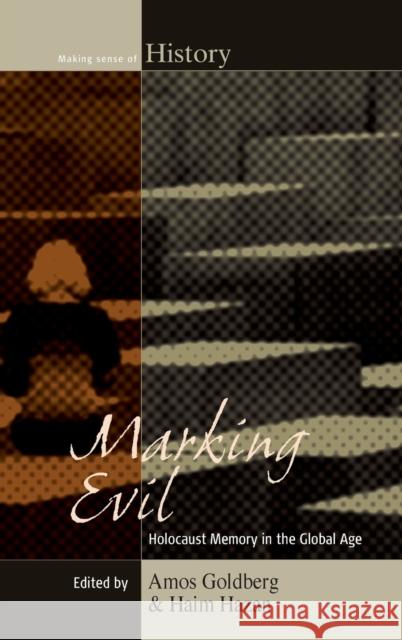Marking Evil: Holocaust Memory in the Global Age » książka
Marking Evil: Holocaust Memory in the Global Age
ISBN-13: 9781782386193 / Angielski / Twarda / 2015 / 384 str.
Marking Evil: Holocaust Memory in the Global Age
ISBN-13: 9781782386193 / Angielski / Twarda / 2015 / 384 str.
(netto: 536,42 VAT: 5%)
Najniższa cena z 30 dni: 539,00
ok. 30 dni roboczych.
Darmowa dostawa!
"This is a superb, original, brave and powerful book... the readings of texts are fresh and provocative, and the book benefits from its wide range of approaches to the question of global memory... I was sent off in many different directions all at once after reading this-who can ask for more from a book, especially one on an ostensibly overcrowded field such as Holocaust Studies?" - Dan Stone, University of London Talking about the Holocaust has provided an international language for ethics, victimization, political claims, and constructions of collective identity. As part of a worldwide vocabulary, that language helps set the tenor of the era of globalization. This volume addresses manifestations of Holocaust-engendered global discourse by critically examining their function and inherent dilemmas, and the ways in which Holocaust-related matters still instigate public debate and academic deliberation. It contends that the contradiction between the totalizing logic of globalization and the assumed uniqueness of the Holocaust generates continued intellectual and practical discontent. Amos Goldberg is a Senior Lecturer in Holocaust Studies at the Hebrew University of Jerusalem and is a Fellow at the Van Leer Jerusalem Institute. He is the author of Trauma in First Person: Diary Writing During the Holocaust and the co-editor with Bashir Bashir of Traumatic Past and Civil Spheres: The Holocaust and the Nakba in Israel/Palestine. Haim Hazan is Professor of Sociology and Social Anthropology at Tel-Aviv University, where he is also co-director of the Minerva Center for the Interdisciplinary Study of the End of Life. He is the author of several books, including The Limbo People; Old Age: Constructions and Deconstructions; Managing Change in Old Age; A Paradoxical Community; From First Principles; Simulated Dreams: Israeli Youth and Virtual Zionism; and Serendipity in Anthropological Research: The Nomadic Turn (edited with Esther Herzog).
"This is a superb, original, brave and powerful book... the readings of texts are fresh and provocative, and the book benefits from its wide range of approaches to the question of global memory... I was sent off in many different directions all at once after reading this-who can ask for more from a book, especially one on an ostensibly overcrowded field such as Holocaust Studies?" · Dan Stone, University of LondonTalking about the Holocaust has provided an international language for ethics, victimization, political claims, and constructions of collective identity. As part of a worldwide vocabulary, that language helps set the tenor of the era of globalization. This volume addresses manifestations of Holocaust-engendered global discourse by critically examining their function and inherent dilemmas, and the ways in which Holocaust-related matters still instigate public debate and academic deliberation. It contends that the contradiction between the totalizing logic of globalization and the assumed uniqueness of the Holocaust generates continued intellectual and practical discontent.Amos Goldberg is a Senior Lecturer in Holocaust Studies at the Hebrew University of Jerusalem and is a Fellow at the Van Leer Jerusalem Institute. He is the author of Trauma in First Person: Diary Writing During the Holocaust and the co-editor with Bashir Bashir of Traumatic Past and Civil Spheres: The Holocaust and the Nakba in Israel/Palestine.Haim Hazan is Professor of Sociology and Social Anthropology at Tel-Aviv University, where he is also co-director of the Minerva Center for the Interdisciplinary Study of the End of Life. He is the author of several books, including The Limbo People; Old Age: Constructions and Deconstructions; Managing Change in Old Age; A Paradoxical Community; From First Principles; Simulated Dreams: Israeli Youth and Virtual Zionism; and Serendipity in Anthropological Research: The Nomadic Turn (edited with Esther Herzog).











